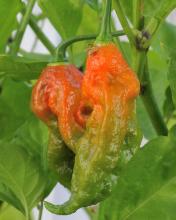Sure, in the same way that the guillotine is "a haircut, essentially."
Fox News commentator Megyn Kelly, while talking about the Occupy and UC Davis protests, dismissed concerns about police officers' heavy-handed use of pepper spray because it's "basically a food product, right?"
Well, yes and no. It is true that pepper spray contains capsicum, which is the active ingredient in hot peppers. Pepper spray causes "immediate closing of the eyes, difficulty breathing, runny nose, and coughing." It can cause corneal damage, and has been implicated in several deaths due to respiratory failure. When you breathe after being sprayed, it causes more of the spray to be inhaled, which can cause panic in many people. The effects last from between 30 minutes to 4 hours.
Sounds delish!
Chili pepper plants have evolved capsicum in order to selectively encourage birds to eat their fruit and disperse the seeds. Birds cannot taste capsicum, and do not find chili peppers to be hot. However, mammals do, and most mammals avoid eating the chilies, which are brightly colored as a warning to the unaware.
Humans, of course, have kind of developed a taste for it. The hotness of chilies is measured in Scoville units. The mildest chilies, like pimentos and peperoncinis, clock in at between 100-900 Scoville units. Jalapeno peppers and Tabasco sauce both run between 3,500-8,000 Scoville units. Serrano peppers: 10,000. Habanero: 100,000-350,000. The Bhut Jolokia chili pepper, the famous "ghost chili," widely recognized as the hottest chili pepper in the world, rates a staggering 1,401,000 on the Scoville scale.
Law enforcement pepper spray rates between 500,000 and 2,000,000 on the Scoville scale. Meaning that it's somewhere in the neighborhood of having the world's hottest chili rubbed into your eyes, nose, and mouth.
Incidentally, a formal study analyzed some of the most common recommendations for treating pepper spray, including Maalox, lidocaine gel, baby shampoo, milk, and water. The study concluded that none of these methods was more useful than the control group (of doing nothing). In other words, time is the only thing that will fix pepper spray.
Because capsaicin is an oily substance, it cannot be rinsed away with water. However, for pepper spray on the skin, a gentle soap may help disperse the oil faster than just letting it burn itself out.
So is it true that pepper spray is "a food product, essentially"? Sure, in the same way it's true that the guillotine is "a haircut, essentially." Saying that pepper causes "stinging in the eyes" is a preposterous understatement.
